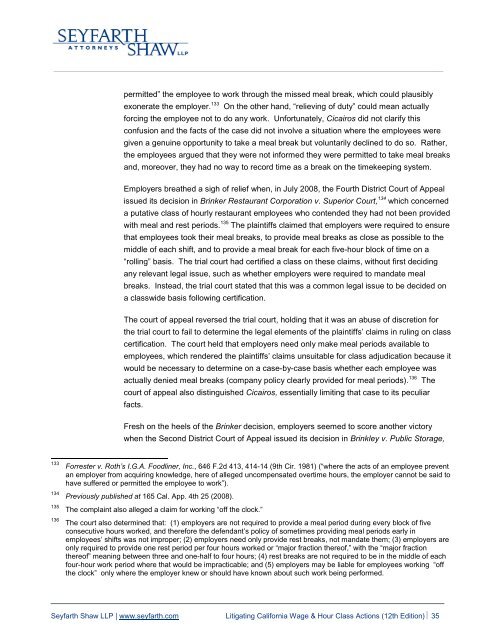Litigating California Wage & Hour and Labor Code Class Actions
Litigating California Wage & Hour and Labor Code Class Actions
Litigating California Wage & Hour and Labor Code Class Actions
You also want an ePaper? Increase the reach of your titles
YUMPU automatically turns print PDFs into web optimized ePapers that Google loves.
permitted” the employee to work through the missed meal break, which could plausibly<br />
exonerate the employer. 133 On the other h<strong>and</strong>, “relieving of duty” could mean actually<br />
forcing the employee not to do any work. Unfortunately, Cicairos did not clarify this<br />
confusion <strong>and</strong> the facts of the case did not involve a situation where the employees were<br />
given a genuine opportunity to take a meal break but voluntarily declined to do so. Rather,<br />
the employees argued that they were not informed they were permitted to take meal breaks<br />
<strong>and</strong>, moreover, they had no way to record time as a break on the timekeeping system.<br />
Employers breathed a sigh of relief when, in July 2008, the Fourth District Court of Appeal<br />
issued its decision in Brinker Restaurant Corporation v. Superior Court, 134 which concerned<br />
a putative class of hourly restaurant employees who contended they had not been provided<br />
with meal <strong>and</strong> rest periods. 135 The plaintiffs claimed that employers were required to ensure<br />
that employees took their meal breaks, to provide meal breaks as close as possible to the<br />
middle of each shift, <strong>and</strong> to provide a meal break for each five-hour block of time on a<br />
“rolling” basis. The trial court had certified a class on these claims, without first deciding<br />
any relevant legal issue, such as whether employers were required to m<strong>and</strong>ate meal<br />
breaks. Instead, the trial court stated that this was a common legal issue to be decided on<br />
a classwide basis following certification.<br />
The court of appeal reversed the trial court, holding that it was an abuse of discretion for<br />
the trial court to fail to determine the legal elements of the plaintiffs’ claims in ruling on class<br />
certification. The court held that employers need only make meal periods available to<br />
employees, which rendered the plaintiffs’ claims unsuitable for class adjudication because it<br />
would be necessary to determine on a case-by-case basis whether each employee was<br />
actually denied meal breaks (company policy clearly provided for meal periods). 136 The<br />
court of appeal also distinguished Cicairos, essentially limiting that case to its peculiar<br />
facts.<br />
Fresh on the heels of the Brinker decision, employers seemed to score another victory<br />
when the Second District Court of Appeal issued its decision in Brinkley v. Public Storage,<br />
133<br />
134<br />
135<br />
136<br />
Forrester v. Roth’s I.G.A. Foodliner, Inc., 646 F.2d 413, 414-14 (9th Cir. 1981) (“where the acts of an employee prevent<br />
an employer from acquiring knowledge, here of alleged uncompensated overtime hours, the employer cannot be said to<br />
have suffered or permitted the employee to work”).<br />
Previously published at 165 Cal. App. 4th 25 (2008).<br />
The complaint also alleged a claim for working “off the clock.”<br />
The court also determined that: (1) employers are not required to provide a meal period during every block of five<br />
consecutive hours worked, <strong>and</strong> therefore the defendant’s policy of sometimes providing meal periods early in<br />
employees’ shifts was not improper; (2) employers need only provide rest breaks, not m<strong>and</strong>ate them; (3) employers are<br />
only required to provide one rest period per four hours worked or “major fraction thereof,” with the “major fraction<br />
thereof” meaning between three <strong>and</strong> one-half to four hours; (4) rest breaks are not required to be in the middle of each<br />
four-hour work period where that would be impracticable; <strong>and</strong> (5) employers may be liable for employees working “off<br />
the clock” only where the employer knew or should have known about such work being performed.<br />
Seyfarth Shaw LLP | www.seyfarth.com <strong>Litigating</strong> <strong>California</strong> <strong>Wage</strong> & <strong>Hour</strong> <strong>Class</strong> <strong>Actions</strong> (12th Edition) 35
















